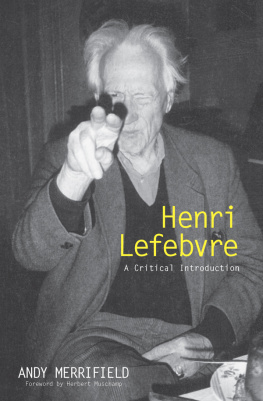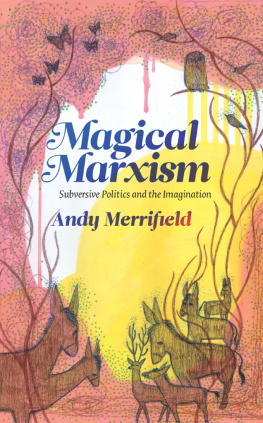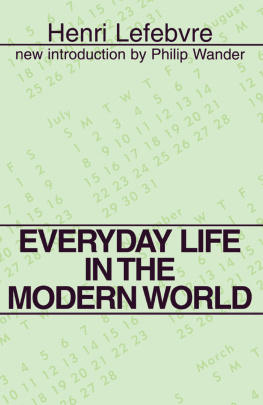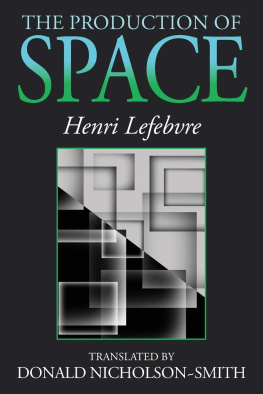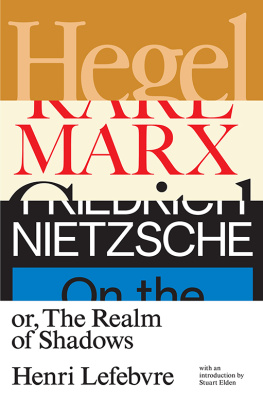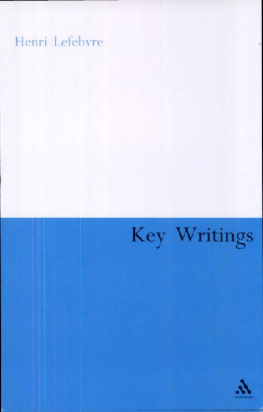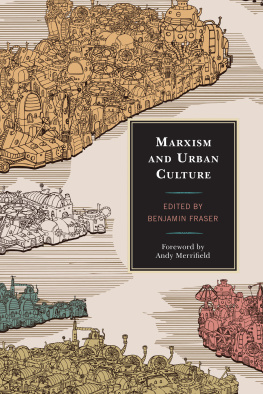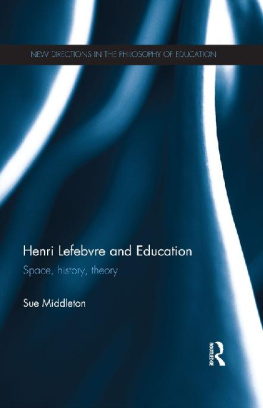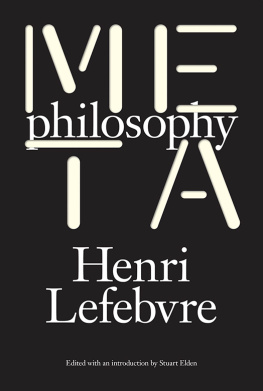Merrifield - Henri Lefebvre
Here you can read online Merrifield - Henri Lefebvre full text of the book (entire story) in english for free. Download pdf and epub, get meaning, cover and reviews about this ebook. publisher: Taylor & Francis (CAM), genre: Romance novel. Description of the work, (preface) as well as reviews are available. Best literature library LitArk.com created for fans of good reading and offers a wide selection of genres:
Romance novel
Science fiction
Adventure
Detective
Science
History
Home and family
Prose
Art
Politics
Computer
Non-fiction
Religion
Business
Children
Humor
Choose a favorite category and find really read worthwhile books. Enjoy immersion in the world of imagination, feel the emotions of the characters or learn something new for yourself, make an fascinating discovery.
- Book:Henri Lefebvre
- Author:
- Publisher:Taylor & Francis (CAM)
- Genre:
- Rating:4 / 5
- Favourites:Add to favourites
- Your mark:
- 80
- 1
- 2
- 3
- 4
- 5
Henri Lefebvre: summary, description and annotation
We offer to read an annotation, description, summary or preface (depends on what the author of the book "Henri Lefebvre" wrote himself). If you haven't found the necessary information about the book — write in the comments, we will try to find it.
Merrifield: author's other books
Who wrote Henri Lefebvre? Find out the surname, the name of the author of the book and a list of all author's works by series.
Henri Lefebvre — read online for free the complete book (whole text) full work
Below is the text of the book, divided by pages. System saving the place of the last page read, allows you to conveniently read the book "Henri Lefebvre" online for free, without having to search again every time where you left off. Put a bookmark, and you can go to the page where you finished reading at any time.
Font size:
Interval:
Bookmark:
| Published in 2006 by | Published in Great Britain by |
| Routledge | Routledge |
| Taylor & Francis Group | Taylor & Francis Group |
| 270 Madison Avenue | 2 Park Square |
| New York, NY 10016 | Milton Park, Abingdon |
| Oxon OX14 4RN |
2006 by Andy Merrifield
International Standard Book Number-10: 0-415-95207-7 (Hardcover) 0-415-95208-5 (Softcover)
International Standard Book Number-13: 978-0-415-95207-1 (Hardcover) 978-0-415-95208-8 (Softcover)
Library of Congress Card Number 2005024643
No part of this book may be reprinted, reproduced, transmitted, or utilized in any form by any electronic, mechanical, or other means, now known or hereafter invented, including photocopying, microfilming, and recording, or in any information storage or retrieval system, without written permission from the publishers.
Trademark Notice: Product or corporate names may be trademarks or registered trademarks, and are used only for identification and explanation without intent to infringe.
Library of Congress Cataloging-in-Publication Data
Merrifield, Andy.
Henri Lefebvre : a critical introduction / by Andy Merrifield.
p. cm.
Includes bibliographical references and index.
ISBN 0-415-95207-7 (hb) -- ISBN 0-415-95208-5 (pb)
1. Lefebvre, Henri, 1905- 2. Social scientists--Biography. 3. Social sciences--Philosophy. I. Title.
H59.L44M46 2006
300.92--dc22 2005024643
| informa | Visit the Taylor & Francis Web site at http://www.taylorandfrancis.com |
| Taylor & Francis Group is the Academic Division of Informa plc. | and the Routledge Web site at http://www.routledge-ny.com |
Corinna, avec une jeunesse du cur
Over the future, everybody deludes themselves. We can only be sure of the present moment. Yet is this true? Can we really know the present? Are we capable of judging it? How can somebody who doesnt know the future make any sense of the present? If we dont know towards which future the present leads us, how can we say that this present is good or bad, that it merits our support or our mistrust, or even our hatred?
Milan Kundera, Lignorance
by Herbert Muschamp
The city of psychoanalysis salutes the land where the Children of Marx and Coca-Cola grew up, or in many cases refused to. But Im showing my age. Its been many years since New York could muster up an audience for angst and Woody Allen. And Godards cool Left Bank cocktail of student disaffection and ye-ye nonchalance lost its sparkle long before Brigitte Bardot started flirting with M. Le Pen.
Moreover, relations between these two places have become more strained even as globalization has thrown everyone into everyone elses laps. As I write this, the United States is still in denial that its position in the world is rapidly approaching the shrunken irrelevancy of post-imperial Great Britain. Were just an island, separated from the great land mass of Eurasia, pretending that we own the joint, indulging expensive fantasies about enlightening the world while turning our backs on countries where concepts of Enlightenment took root. Not good.
Manhattan, meanwhile, is an island within an island, imagining itself as a leader of Blue State (liberal, Democratic) sensibilities while the record strongly indicates that it has actually been the reverse. It is New York that has given us Rudolph Giulianis chronic hostility toward the First Amendment; fake pre-modern architecture; news magazines featuring cover stories on assorted mythological religious figures; and other convulsions of Red State backlash against the long-ago 1960s and in general anything that breathes.
Havent they heard Marx is dead?, Giuliani replied when asked about his plans to uproot community gardens to make room for luxury housing. Heave-ho! While The New York Review of Books canceled its subscription to liberal thought by publishing stories that claimed to discredit Freud.
But never mind. So long as Andy Merrifield is living in France and I remain in New York, Marx and Freud are still conversing with one another across the divide of water, ideology, and time. In my perplexed head, Merrifield and I are two halves of a whole. Were one of the last great Surrealists. Our mutual amour fou is the city: the courting ground of crazy love.
Merrifields got his Marx down better than Ill ever get my Freud. Hes become a one-man, year-round, world-wide festival of non-vulgar Marxism. Im just an old-fashioned nut case. But Surrealists are not required to be experts in either field. We define our own field. It is bordered on two sides by history: one border chronicles the outer life, the other one tracks the inner. Mr. M and Mr. F sit like referees atop tall spindly chairs on either line. Out! In!
The remaining sides of the field are left open. One of these trails off into the future, the other drifts backward toward a ground of origin that is unknowable apart from myth. Culture happens in the middle. The forms it takes are not invariably symptoms. But sometimes the symptoms are thrilling also. We set up bleachers. We boo and cheer.

Merrifield booed me once. I didnt mind too much. When smart people boo, you should take it as an invitation to call them right up and say, Hi, there! Merrifield had taken offense at a reference I made to Guy Debord in a story about Times Square. I seem to recall his saying something mild, like Debord would have hated Muschamp and everything he stands for. Setting aside the rhetorical propriety of airing ones sentiments through the mouths of dead people, I nonetheless decided to interpret the boo as an instance of what Buddhists call negative attachment. The attachment is the main thing. The negativity is the attachments shadow. And it doesnt pay to get too caught up with shadows. Often, theyre just there to be enjoyed, like any play of light on the wall. Sometimes they boo. Sometimes they act scarier and say Boo! But the smarter breed just wants to come in and play.
The city that we hate is also the city that we love. It strikes me that Henri Lefevbres work and Andy Merrifields both spring from this variation on what Melanie Klein called the depressive position. It is the business of a city to offer something for everyone to hate, even to present itself as completely hateful to some people most of the time. But even Frank Lloyd Wright, who devoted endless energy to denouncing the city as the Moloch that knows no god but More, couldnt resist being swallowed up by New York from time to time. And the intensity of his attachment was even more evident in the passion of his attacks. I share with Sybil Maholy-Nagy the view that the city is the matrix of man, whatever our feelings might be toward it. And try as you may you simply cannot keep Mother down in the fruit cellar forever. She will not stay there.
Henri Lefebvre introduced a stance of radical ambivalence toward the city in his book The Urban Revolution, first published in France in 1970 but not issued in English translation until 2003. He dramatizes this position in his first chapter, From the City to Urban Society, with a dialectical exchange for and against the concepts of streets and monuments. The likelihood is that most readers can identify with both positions, in whole or in part. Neither is unintelligent, and the recognition that we can and do live with these opposites is tonic. We can defer judgment until were more adept at grasping the dialectic process revealed by the unfolding of urban experience.
Font size:
Interval:
Bookmark:
Similar books «Henri Lefebvre»
Look at similar books to Henri Lefebvre. We have selected literature similar in name and meaning in the hope of providing readers with more options to find new, interesting, not yet read works.
Discussion, reviews of the book Henri Lefebvre and just readers' own opinions. Leave your comments, write what you think about the work, its meaning or the main characters. Specify what exactly you liked and what you didn't like, and why you think so.

